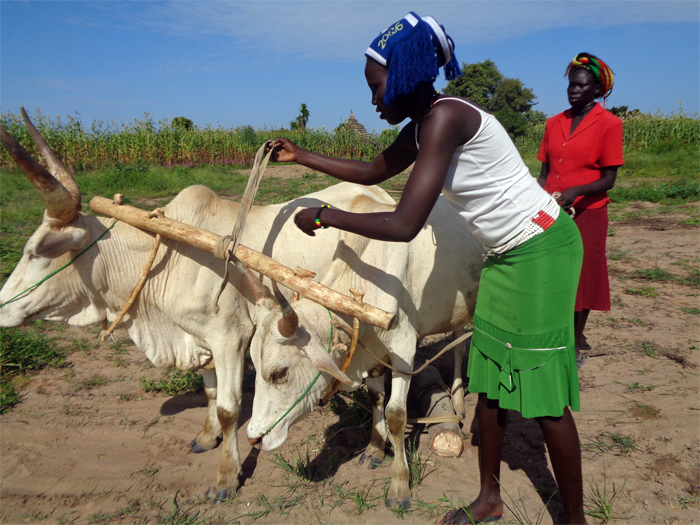For the past several years, South Sudan has struggled to feed its population. In 2018 an estimated 6 million people experienced food shortages and hunger. This is directly related to the upheaval and insecurity caused by an internal conflict that has resulted in 1.9 million people displaced internally and 1.2 million who have fled the country as refugees. VWB/VSF is continuing its efforts to create sustainable solutions to the food crisis by helping South Sudanese farmers produce more and better food. This project is a partnership with Vétérinaires Sans Frontières Suisse and Help Restore Youth South Sudan (HERY SS), and is funded by the European Union. Its goal is to help reduce dependency on food aid in the area formerly know as Northern Bahr el Ghazal State.

The use of animal traction has the potential to dramatically increase the amount of land producing food in South Sudan. Women and men are learning to train donkeys and oxen to pull plows, and the project is also supplying plows and harnesses.
Over a three year period, this project will help more than 10,000 small holder farm families to improve their production through training , more and better inputs for livestock and crop production, and support from animal health workers and agricultural extension workers. Farmer field schools will be one of the primary tools for farmer education.
Just four per cent of South Sudan's arable land is currrently producing food. One proven way to increase the land under cultivation is through animal traction. Farmers will learn how to train oxen and donkeys to pull plows, and implements will be manufactured and distributed. As well, improvements to storage, transportation, and marketing systems will not only benefit farmers, but also traders and distributors who are part of the value chain. There is a particular emphasis on women and youth in this part of the project.
Working in South Sudan presents some dramatic challenges. It is a very poor country and has endured decades of conflict. Education and health indicators are among the lowest in the world, reflecting the impact of protracted conflict and limited provision of social services. Only 27 per cent of the adult population is literate and less than half of all primary school-aged children are in school (51% boys and 37% girls). Yet overcoming poverty is all about confronting difficult challenges. South Sudan has enormous agricultural potential, and it is a good fit for Veterinarians without Borders because in many areas of the country, livestock is incredibly important culturally, nutritionally, and economically. VWB/VSF has worked in South sudan since 2013 through two previous initiatives.(see pas projects).